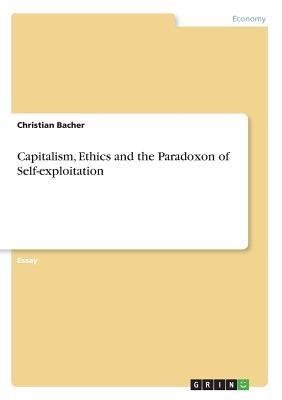
- We will send in 10–14 business days.
- Author: Christian Bacher
- Publisher: GRIN Verlag
- Year: 2007
- Pages: 44
- ISBN-10: 3638636585
- ISBN-13: 9783638636582
- Format: 14.8 x 21 x 0.3 cm, softcover
- Language: English
- SAVE -10% with code: EXTRA
Capitalism, Ethics and the Paradoxon of Self-exploitation (e-book) (used book) | bookbook.eu
Reviews
Description
Essay from the year 2005 in the subject Business economics - Operations Research, grade: A+, University of Otago (Department of Management), course: Business Policy, language: English, abstract: "The driving force of capitalism is the attainment of increasing rates of surplus value. This is inevitably exploitative and demeaning of the human condition. This makes an increased awareness of ethics in business practise untenable. Discuss." The statement comprises of three arguments, or, more specifically, one argument and two consequences. They consist of the type argument 'if A then B' and 'if A and B then C'. In addition there is the request to 'discuss' in the statement. 'Discuss' could only apply to 'C'. In this case 'A' and 'B' would be taken for granted. I cannot easily accept this so I apply 'discuss' to 'A', 'B' and finally 'C' and approach each phrase separately. So I can reveal that 'if A and B then C' is only true under prior assumptions made about 'A' and 'B'. Chapter A deals with 'A', capitalism. Here I will provide a definition of capitalism containing its characteristics and effects and arrive at the answer as to whether "increasing rates of surplus value" are the "driving force of capitalism". Chapter B shall examine whether capitalism "is inevitably exploitative and demeaning to the human condition". But before the terms 'exploitation', 'demeaning' and 'human condition' are discussed, they need to be defined. This chapter contains an analysis how 'capitalism' and 'humans' interact and interfere each other. Chapter C works on 'untenable (business) ethics'. Ethics, business ethics and their significance for 'humans' and 'capitalism' are presented. The focus here will be on the overlapping areas of 'ethics' with the contents of the other two chapters. The chapter concludes with conditions that fulfil the statement 'if A and B then C', with arguments discussed in light of the essay statement. But, actually, things are not that easy. The path of argument
EXTRA 10 % discount with code: EXTRA
The promotion ends in 11d.07:14:00
The discount code is valid when purchasing from 10 €. Discounts do not stack.
- Author: Christian Bacher
- Publisher: GRIN Verlag
- Year: 2007
- Pages: 44
- ISBN-10: 3638636585
- ISBN-13: 9783638636582
- Format: 14.8 x 21 x 0.3 cm, softcover
- Language: English English
Essay from the year 2005 in the subject Business economics - Operations Research, grade: A+, University of Otago (Department of Management), course: Business Policy, language: English, abstract: "The driving force of capitalism is the attainment of increasing rates of surplus value. This is inevitably exploitative and demeaning of the human condition. This makes an increased awareness of ethics in business practise untenable. Discuss." The statement comprises of three arguments, or, more specifically, one argument and two consequences. They consist of the type argument 'if A then B' and 'if A and B then C'. In addition there is the request to 'discuss' in the statement. 'Discuss' could only apply to 'C'. In this case 'A' and 'B' would be taken for granted. I cannot easily accept this so I apply 'discuss' to 'A', 'B' and finally 'C' and approach each phrase separately. So I can reveal that 'if A and B then C' is only true under prior assumptions made about 'A' and 'B'. Chapter A deals with 'A', capitalism. Here I will provide a definition of capitalism containing its characteristics and effects and arrive at the answer as to whether "increasing rates of surplus value" are the "driving force of capitalism". Chapter B shall examine whether capitalism "is inevitably exploitative and demeaning to the human condition". But before the terms 'exploitation', 'demeaning' and 'human condition' are discussed, they need to be defined. This chapter contains an analysis how 'capitalism' and 'humans' interact and interfere each other. Chapter C works on 'untenable (business) ethics'. Ethics, business ethics and their significance for 'humans' and 'capitalism' are presented. The focus here will be on the overlapping areas of 'ethics' with the contents of the other two chapters. The chapter concludes with conditions that fulfil the statement 'if A and B then C', with arguments discussed in light of the essay statement. But, actually, things are not that easy. The path of argument


Reviews